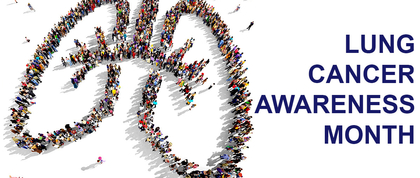
Lung cancer has been a voracious thief in my family, robbing us of several aunts and uncles and many of my loved ones and close friends.
As a former smoker, I get a computed tomography (CT) scan annually because science shows it is a proven detection method in finding lung cancers early, when they are most treatable.
Because this is such an important issue for me both personally and professionally, each November, when Lung Cancer Awareness Month is upon us, I always take a moment to talk about the latest in lung cancer developments.
First some facts. According to the US Centers for Disease Control and Prevention:
- Lung cancer is the second most common cancer among both men and women in the United States.
- Each year, about 218,000 people in the United States are told they have lung cancer and about 149,000 people die from this disease.
The good news is that medical breakthroughs and historic declines in smoking traditional cigarettes have resulted in marked reductions in the diagnosis of lung cancer.
But what used to be considered a disease disproportionately affecting men has now detoured. Last year, the New England Journal of Medicine published a study that found “rates of lung-cancer incidence actually rose over the past 20 years among women born around either 1950 or 1960; in younger women, diagnoses fell, but not as much as among men.” (TIME)
With Veteran’s Day observed earlier this week, it's also worth noting that the incidence of lung cancer is higher among American veterans, coupled with lower survival rates. For more information on lung cancer in our military, click here.
Experts say that risk factors include family history, smoking, and being exposed to secondhand smoke, radon gas, asbestos or other carcinogens. But many people who have none of these can still be diagnosed. Ways to help decrease the odds are to never smoke or quit if you do, limit your exposure to secondhand smoke, and consider having your home tested for radon.
The criteria for lung cancer screening as outlined by the U.S. Preventive Services Task Force are being updated, but if you meet them as currently written, please get screened. Also, If you previously smoked and have a family history of lung cancer, many lung cancer specialists believe you should still be screened even if you quit more than 15 years ago. As lung cancer is the leading cause of cancer death, it's critical that we make early detection a top priority in November and every month of the year.
![]()
Cheryl G. Healton, DrPH
GPH Dean and
Vice Chair, GO2 Foundation for Lung Cancer